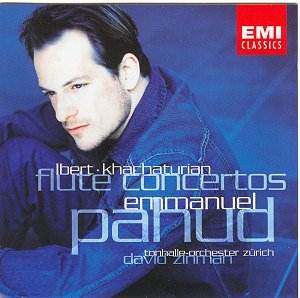Following
quickly on the heels of his wonderful recording of Telemannís
flute concertos on EMI Classics 5 57397 2, exciting young
flautist Emmanuel Pahud now turns his attention from late baroque
to accessible twentieth century repertoire.
Armenian-born
composer Aram Khachaturian is renowned for composing in
bright colours with bold and frequently memorable melodies. Infused
with folk music the scores often contain picturesque and exotic
textures. The three movement Flute concerto is a transcription
of Khachaturianís violin concerto of 1940 made by the eminent
flautist Jean-Pierre Rampal. Although worthwhile in extending
the range of the limited flute repertoire I feel the transcription
never really approaches the romantic effectiveness and singing
quality of the original violin version. The soloist Emmanuel Pahud
plays this approachable and felicitous work with a real passion
and vigorously exploits the virtuoso passages although it would
have been preferable for maestro Zinman to have toned-down the
composerís often garish orchestration. The sound quality of the
work is very bright and frustratingly blurs at the edges in the
forte orchestral passages.
Jacques
Ibertís Flute concerto from 1936, along with the Divertissement
for chamber orchestra (1930) are composerís most popular works.
Full of charm and strongly lyrical the three movement concerto
typifies Ibertís style. It is often stated that the Parisianís
music is shallow in terms of substance however I feel that the
Flute concerto manages to hold-up against the charge if
given a fine performance. Thankfully Pahud, aided by the Tonhalle-Orchester
Zurich, is in excellent form and delivers a spirited reading,
enabling the music to sparkle. I particularly enjoyed the soloistís
sensitive handling of the haunting melody of the poetic second
movement Andante. In this score the sonics tend to make
the fluteís top-register sound shrill which detracted somewhat
from the pleasure of the performance.
Ibertís
Pièce pour flute seule (Piece for solo flute) composed
in 1936 is an accessible and attractive work frequently used in
flute examinations and as a recital encore piece. Pahud makes
light-work of the virtuoso demands of the rustic-like score although
the sound engineers have caught rather too much of the soloistís
breathing technique for my liking.
The
talented Emmanuel Pahud has the full measure of these most approachable
and rather lightweight scores. Pahud delivers fine performances
all round but the listening experience is reduced by the somewhat
varying and problematic sound quality.
Michael
Cookson
